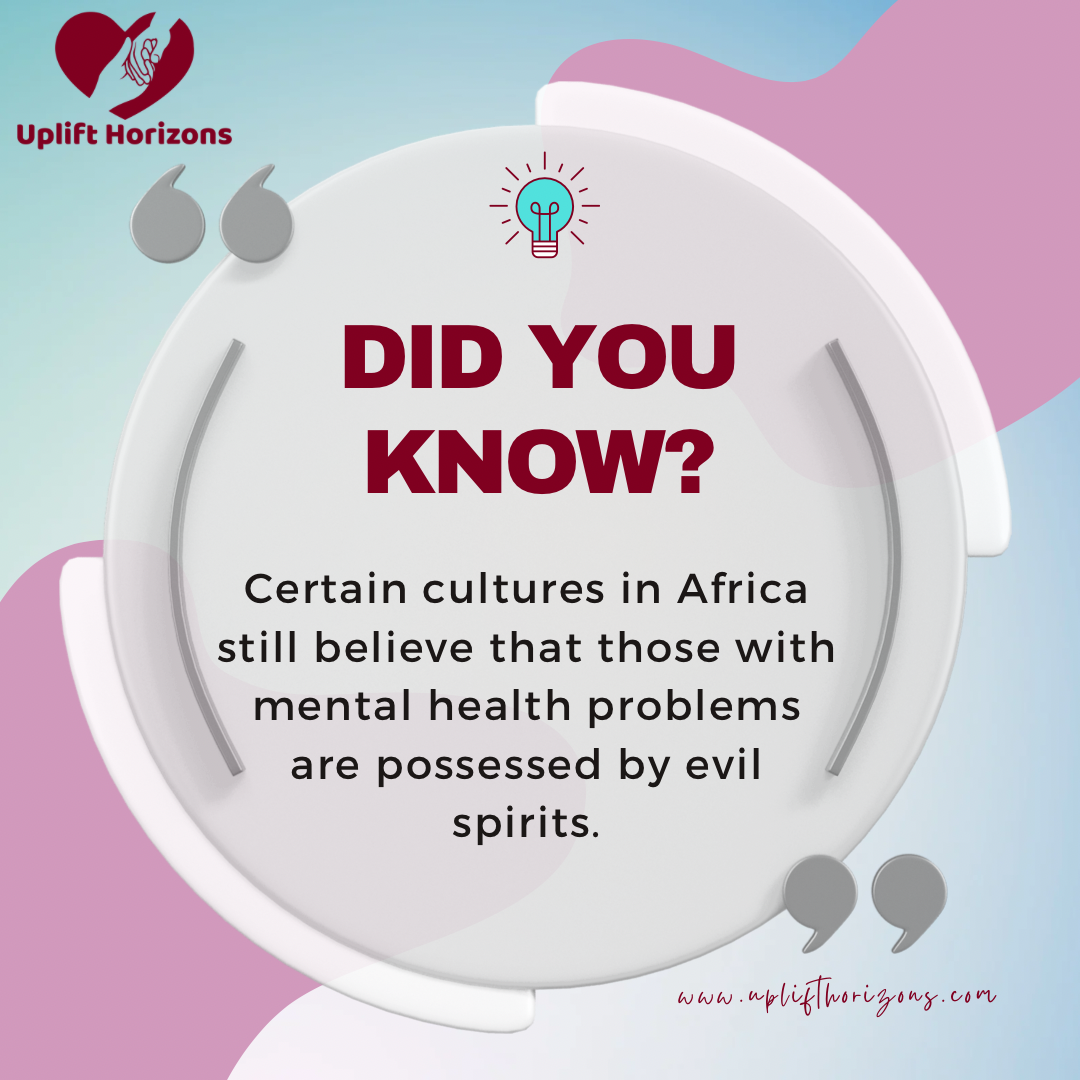Beliefs that mental health problems are caused by possession by evil spirits or supernatural forces are indeed prevalent in some African cultures. This perspective is deeply rooted in traditional belief systems and can have significant implications for how mental health is perceived and treated in these communities. Here’s an elaboration on this belief:
𝟏. 𝐓𝐫𝐚𝐝𝐢𝐭𝐢𝐨𝐧𝐚𝐥 𝐁𝐞𝐥𝐢𝐞𝐟 𝐒𝐲𝐬𝐭𝐞𝐦𝐬: Many African societies have rich and complex traditional belief systems that incorporate a strong spiritual element. In these belief systems, it’s often believed that mental illness is a result of displeasing or angering spirits, ancestors, or deities. When someone exhibits unusual behavior or mental distress, it’s interpreted as a manifestation of spiritual disturbance or possession.
𝟐. 𝐂𝐮𝐥𝐭𝐮𝐫𝐚𝐥 𝐂𝐨𝐧𝐭𝐞𝐱𝐭: Understanding this perspective requires recognizing the cultural context. In many African cultures, the spiritual realm is considered as real and tangible as the physical world. Spiritual leaders, such as traditional healers or shamans, play a crucial role in addressing these issues. They are often consulted to diagnose and treat mental health problems that are perceived as spiritual in nature.
𝟑. 𝐒𝐭𝐢𝐠𝐦𝐚𝐭𝐢𝐳𝐚𝐭𝐢𝐨𝐧: Unfortunately, the belief in possession by evil spirits can contribute to the stigmatization of individuals with mental health issues. People suffering from mental health problems may be ostracized, isolated, or even subjected to harmful traditional rituals or exorcisms in an attempt to rid them of the perceived evil influence.
𝟒. 𝐁𝐚𝐫𝐫𝐢𝐞𝐫𝐬 𝐭𝐨 𝐓𝐫𝐞𝐚𝐭𝐦𝐞𝐧𝐭: The belief in possession can also deter individuals and their families from seeking professional mental health treatment. Instead, they may turn to traditional healers or religious leaders for help, which may not always be effective in addressing the underlying mental health condition. This can result in delayed or inadequate treatment for those who need it.
𝟓. 𝐂𝐡𝐚𝐧𝐠𝐢𝐧𝐠 𝐏𝐞𝐫𝐬𝐩𝐞𝐜𝐭𝐢𝐯𝐞𝐬: It’s important to note that not all Africans hold these beliefs, and attitudes toward mental health are evolving. Urbanization, exposure to Western medical practices, and increased awareness campaigns have led to changing perspectives in some regions. Mental health professionals and organizations are working to bridge the gap between traditional beliefs and evidence-based mental health care.
𝟔. 𝐇𝐨𝐥𝐢𝐬𝐭𝐢𝐜 𝐀𝐩𝐩𝐫𝐨𝐚𝐜𝐡𝐞𝐬: Some African cultures emphasize holistic approaches to healing, which integrate both traditional and modern medical practices. In this context, mental health treatment may involve a combination of spiritual rituals, counseling, and medication.
𝟕. 𝐂𝐮𝐥𝐭𝐮𝐫𝐚𝐥 𝐒𝐞𝐧𝐬𝐢𝐭𝐢𝐯𝐢𝐭𝐲: When addressing mental health in African communities that hold these beliefs, it’s crucial to approach the issue with cultural sensitivity. Mental health professionals and advocates often collaborate with traditional healers and community leaders to promote awareness, reduce stigma, and provide culturally appropriate support and treatment.
In summary, the belief that mental health problems are caused by possession by evil spirits is deeply rooted in certain African cultures and belief systems. Addressing mental health in these communities requires a nuanced approach that respects cultural traditions while also promoting evidence-based mental health care and reducing stigma associated with mental illness.
References:
Patel, V., & Prince, M. (2010). Global Mental Health: A New Global Health Field Comes of Age. JAMA, 303(19), 1976–1977. https://jamanetwork.com/journals/jama/article-abstract/185580
Okello, E. S., & Neema, S. (2007). Explanatory Models and Help-Seeking Behavior: Pathways to Psychiatric Care Among Patients Admitted for Depression in Mulago Hospital, Kampala, Uganda. Qualitative Health Research, 17(1), 14–25. https://journals.sagepub.com/doi/abs/10.1177/1049732306294109
Sorketti, E. A., et al. (2017). Cultural Beliefs and Attitudes Towards Mental Health and Psychiatry Among Health Workers in Iraq. Early Intervention in Psychiatry, 11(5), 431–436. https://onlinelibrary.wiley.com/doi/abs/10.1111/eip.12331
Gureje, O., et al. (2006). Influence of Culture on the Recognition of Mental Disorders as Exemplified by the Idioms of Distress Among the Yoruba. Acta Psychiatrica Scandinavica, 113(s429), 47–53. https://onlinelibrary.wiley.com/doi/full/10.1111/j.1600-0447.2006.00812.x





